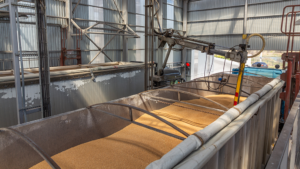Giving from the farm
CONVERSATIONS WITH BUSINESS EXPERTS

(J.M.) HOW IS CHARITABLE GIVING ACCOUNTED FOR IN A FARM BUSINESS?
(K.A.) The ability to support your local community or organizations that are important to you is so rewarding. For some, that means charitable giving or the donation of money or in-kind products. For others, giving your time as a volunteer can be just as important.
Donating to a registered charity does have accounting and tax implications for a farm business. A charitable receipt or proof of your donation can be applied to receive a charitable donation tax credit. Those credits must be used within five years before they expire, meaning you can carry them over from year to year to maximize taxable benefits within the five-year period. Charitable receipts are proof of any donation and should be submitted to your accountant, so be diligent in collecting and filing receipts properly. If you are looking to receive a tax credit within the current fiscal year, be sure your donation and receipt align with those dates. Donations made to a registered charity outside of Canada cannot be claimed as a tax credit unless certain criteria are met, so be sure to consult your accountant if this applies to your business.
ANY ADVICE ON DECIDING HOW MUCH TO GIVE?
Giving is a personal choice and is driven by individuals and their interests and passions. I always advise clients who want to give back to their community to reflect on their own values and make sure the group or organization they are donating to aligns with their personal or professional core values. Asking yourself questions like who or what charitable groups you resonate with, what are the needs of your community, and what or who you want to support can help with the decisions — especially if you have a set percentage or dollar amount to work within. And never forget the value of volunteering your time; giving does not just have to be in the form of money or product.
When it comes to determining how much to give, it is important to use all the information available to make sure you are giving within your means. Consider allocating a percentage of after-tax net income, finding a value you and your farm business are comfortable with. Crunch these numbers by taking the net income after tax, less any principal payments and cash you will need for your own purchases in the coming year. From there, you can get a clear picture of your financial position and your giving capabilities.
I do not advise making charitable giving decisions solely based on tax implications, but remind clients to get charitable receipts if the donation applies.
HOW CAN FARMERS PARTICIPATE IN COMMUNITY FOOD PROGRAMS DONATION TAX CREDIT?
Through this program, farm businesses can receive tax credits in addition to the charitable donation tax credit for donating agricultural products to eligible community food programs in Ontario. The credit is worth 25 per cent of the fair market value of the products donated, and the additional 25 per cent tax credit must be claimed in the same year the donation is made.
A qualifying donation can be an agricultural product like vegetables, meat, eggs, grains or anything else that is harvested on the farm and may be sold legally and must be made to an eligible community food program.
If you are new to this program, it is a good idea to consult your accountant to determine the details of product eligibility and how the tax credit is accounted for. Some products are more straightforward than others, like donating excess vegetables, fruit, or processed meat, while milk and grains can require a different approach. It is also important to remember that there may be additional costs incurred to transport the products, but the benefits of supporting your local community may outweigh the costs. For more information about the community food program donation tax credit for farmers, visit www.ontario.ca/ page/community-food-program-donation-tax-credit-farmers or talk to your farm accountant.
WHAT ABOUT SUPPORTING THE COMMUNITY BEYOND A REGISTERED CHARITY?
Many farm businesses support community organizations and sports teams. These contributions can also be applied to tax returns as an expense filed under advertising and promotion. So, if you are sponsoring the jerseys for your local hockey team, do not forget to ask for a receipt for the value, along with a description of your business exposure and promotion, like where the logo appeared. •



















